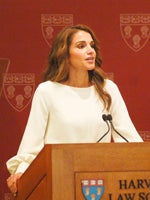On Thursday, Nov. 7, Queen Rania Al Abdullah of Jordan announced a new educational partnership between Harvard and her foundation, kicking off the seventh annual Harvard Arab Weekend, the largest pan-Arab conference in North America.
Speaking at Harvard Law School’s Wasserstein Hall, Queen Rania linked Charles Dickens’ famous opening lines to “A Tale of Two Cities” to the modern Arab world, responding to pessimists who view the current turmoil in much of that world as evidence of “the worst of times” and the “season of darkness.” She candidly agreed that there was cause for alarm, citing fears of food and water scarcity, high unemployment, low workforce participation by women, a skills mismatch in the labor force and rising inequalities. But “pessimism doesn’t change the reality,” she said. “It prolongs the status quo.”
Instead, Queen Rania encouraged the 350-person audience to end the “self-reinforcing cycle of suffering” and to remain optimistic as the region undergoes a time of great transition, citing youth movements aimed at creating moderate, democratic governments and high rates of entrepreneurship, creativity and intellectual engagement.
In keeping with that theme, Queen Rania announced a new partnership between the Queen Rania Foundation and edX, a Harvard and MIT partnership that offers massive open online courses (MOOCs), high quality online courses taught to a unprecedented numbers of learners around the world. Together, her foundation and edX are launching an Arabic-language MOOC portal called Edraak, which will offer Arabic translations of select courses, as well as develop its own courses taught by leading Arab professors and professionals that will be available throughout the Arab world for free.
“It will be engaging, fresh, relevant, and most important, in Arabic,” Queen Rania said. “MOOCs will open up a world of possibilities for intellectually healthy Arab youth. MOOCs can be and will be a great asset in the education reform toolbox.”
In her opening remarks, Dean Martha Minow lauded Queen Rania’s focus on improving inefficient education systems and fighting for greater access to high quality education. In 2008, Queen Rania launched Madrasati, a partnership that renovates needy public schools and provides educational programs. In addition, she has established a teacher’s academy, a children’s museum, and the Jordan River Foundation, aimed at empowering local communities, particularly women and children.
Thus the queen’s recommendations for the Arab world focused largely on improving educational access and opportunities. “It’s not a panacea for all our ills, but done well, done creatively, it can positively impact many of the social, political and economic challenges that our region faces,” she said. Education is “perhaps the greatest equalizer.”
Following the queen’s remarks, Prince Moulay Hicham of Morocco spoke about the impact of the Arab Spring. The two addresses marked the beginning of a four-day weekend anchored around three linked themes: cherish, challenge and change, portraying an alternative understanding of the Arab world.
